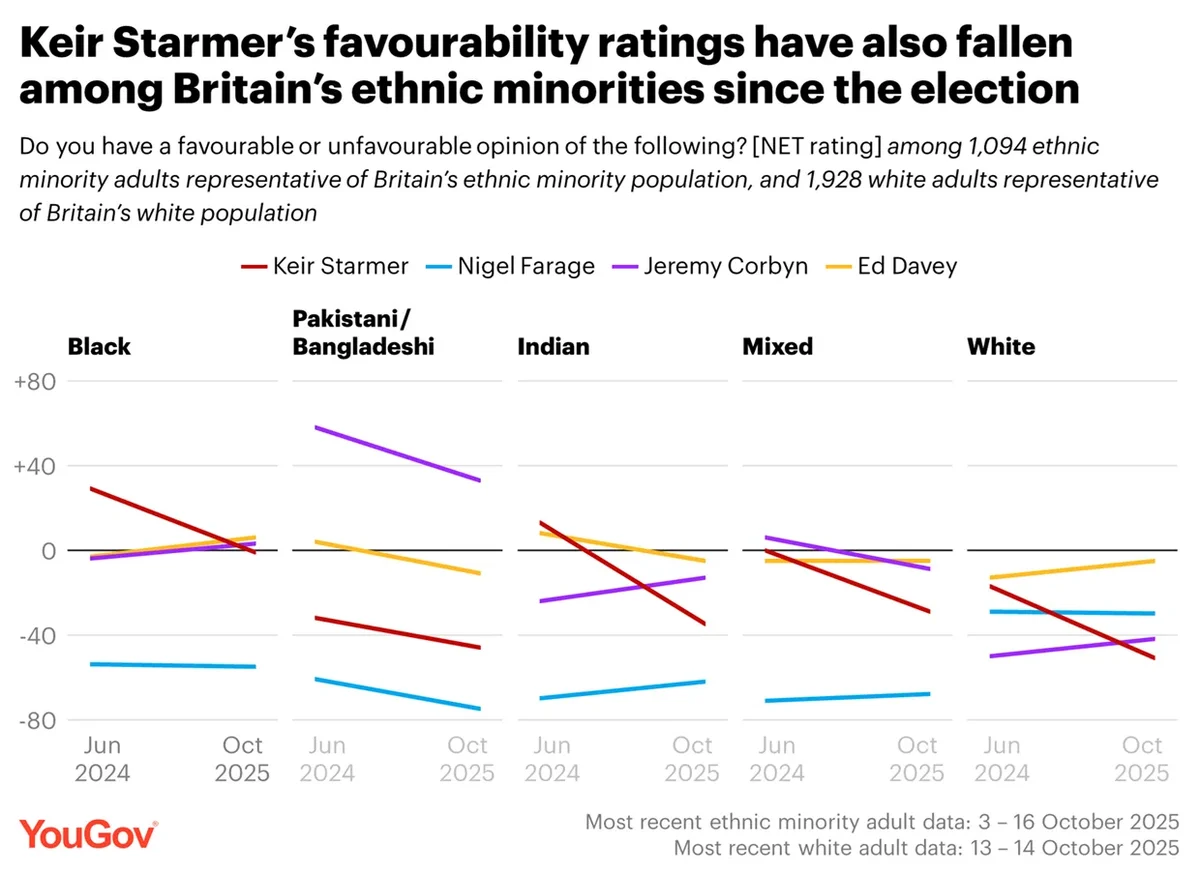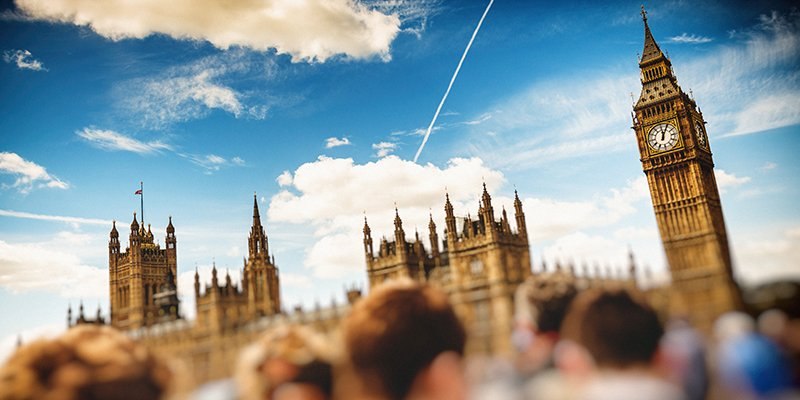Cost of living is the top issue for ethnic minority communities, while 69% see Reform UK as a racist party
A new YouGov survey of 1,094 ethnic minority adults reveals how they feel about the UK’s main parties and politicians, as well as what they see as the most important political issues facing the country. It also allows us to delve into differences in opinion between Britain’s diverse and often politically divergent ethnic minority communities.
What are the most important issues for Britain’s ethnic minorities?
The cost of living is the top issue for Britain’s ethnic minority communities, with 59% saying it is one of the biggest problems facing the country at this time. This is the most common top concern across all minority ethnic groups, including 67% of both black and mixed-race adults, 59% of those with Indian heritage and 50% of those of Pakistani or Bangladeshi descent.
The cost of living is followed in the rankings by the wider economy (43%) and immigration (33%). One in five (21%) see health a key political issue, while housing and crime are seen as the most important issues by one in six (17-18%).
Gaza stands out as a particular issue for adults with Pakistani or Bangladeshi heritage, with 35% saying it is one of the most pressing problems facing the country, relative to 7-9% of other ethnic minority groups.
Britain’s Indian and Black communities are notably more likely than other ethnic minority groups to see immigration as a top issue facing the country, with four in ten (38-40%) saying so, compared to 28% of those with mixed heritage and just 22% of those in the Pakistani or Bangladeshi communities.
Immigration is lower down the agenda when asked about the most important issues facing “you and your family”, with only 11% of ethnic minority adults seeing it as such. The cost of living still dominates on this question, with 63% viewing it as a top problem for them and their family, ahead of the economy (36%), health (25%) and taxation (21%).
Taxation is particular concern for the Indian community, with 29% seeing it as one of the most important issues facing their family, compared to 17-19% of those from the Black, mixed, and Pakistani and Bangladeshi ethnic groups. By contrast, 20-23% of these groups see housing as a major problem for their family, relative to 11% of people with Indian heritage.
A quarter of those in the Pakistani and Bangladeshi communities (27%) describe the conflict in Gaza as a top issue impacting their family.
Political favourability ratings, among Britain’s ethnic minorities
As with the wider British public, opinion towards Keir Starmer among ethnic minority people is largely negative, with 61% seeing the prime minister unfavourably, twice the 31% who see him in a positive light. However, this is not true of all ethnic minority groups, with Black adults split 43% to 44% in their opinion of the Labour leader.
By contrast, Starmer’s predecessor as Labour leader – Jeremy Corbyn – is the most popular political figure polled among Britain’s ethnic minorities, although even he is divisive: 39% see him favourably, matched by 42% who view the left-winger unfavourably.
Britain’s ethnic minority communities differ greatly in their opinions of Corbyn. While those with Pakistani or Bangladeshi heritage see him positively by 57% to 24%, Black people are split 38% to 35% over him, while those of Indian descent tend to see the former Labour leader unfavourably by a margin of 48% to 35%.
Nigel Farage is less popular among ethnic minorities than among the public as a whole, with just 13% having a favourable opinion of the Reform UK leader, while eight in ten (79%) see him negatively.
One in six of those in Britain’s ethnic minority communities (18%) hold a favourable opinion of Kemi Badenoch, while 61% see the Tory leader unfavourably. Opinion is near-evenly split 28% to 31% on Lib Dem leader Ed Davey and 23% to 25% on recently elected Green leader Zack Polanski.
When compared to our study of ethnic minority attitudes just before the last general election, Keir Starmer’s net favourability ratings have fallen significantly among all minority ethnic groups, though this ranges from a 48 point drop among those with Indian heritage to a 14 point drop among the Pakistani and Bangladeshi communities, among whom he already held a net negative rating.
Jeremy Corbyn has also experienced a significant decline in popularity among those of Pakistani or Bangladeshi descent, with his net favourability score dropping by 25 points among them since last June, although he holds a net positive score with this group (+33).
Nigel Farage’s rating has likewise sunk a further 14 points among those of Pakistani or Bangladeshi heritage since the election, to -75.

How do Britain’s ethnic minorities see the political parties?
While Labour has traditionally been the most popular party among Britain’s ethnic minorities, a majority (55%) now hold an unfavourable opinion of the party, relative to 36% seeing them favourably. Within this, Black adults are an exception, still tending to view Labour in a good light by 51% to 37%.
Instead, it is the Greens who are the most positively viewed party among Britain’s ethnic minorities today, with nearly half (47%) holding a favourable opinion of the party, compared to just 30% seeing them unfavourably. The Pakistani and Bangladeshi communities are the most positive towards the party, with 58% having a favourable opinion of the Greens, likely in part due to the party’s stance on Gaza.
The Conservatives are viewed unfavourably by ethnic minorities as a whole, by 67% to 23%. Britons of Indian descent are less negative towards the party, though the 56% with an unfavourable opinion of the party still outnumber the 37% who see the Tories favourably.
What do Britain’s ethnic minorities think of Reform UK?
Reform UK are the least liked major party among Britain’s ethnic minorities, with just one in seven (14%) having a positive view of Nigel Farage’s party, relative to 76% seeing it unfavourably.
Likely playing a central role in this is a perception that Reform UK is racist. Seven in ten (69%) believe that the party itself is generally racist, with a similar number (68%) viewing the party’s policies as racist and 63% believing that those who vote for the party are racist.
These opinions are held by majorities of all major ethnic minority groups, though are highest (77-82%) among the Pakistani and Bangladeshi communities.
This compares to 46% of white adults from a study in September believing that Reform UK is generally racist and 38% feeling they are not.
What do you see as the most important issues facing the country? What do you think about British politics in general, and everything else? Have your say, join the YouGov panel, and get paid to share your thoughts. Sign up here.
Photo: Getty












